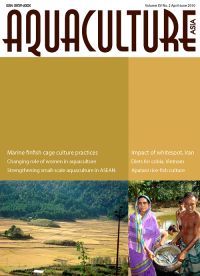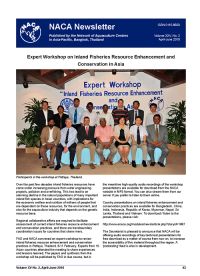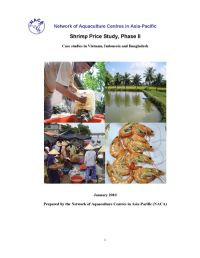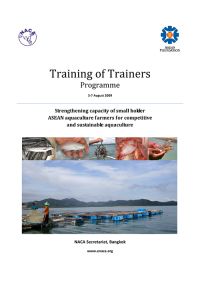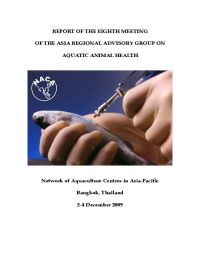In this issue:
The Dedanaw Project, Myanmar. The changing face of women for small-scale aquaculture in Bangladesh. Strengthening capacity of small holders in ASEAN. Carp seed production in Orissa, India. Sustainable mountain paddy-fish farming of the Apatani tribes. The economic impacts of whitespot virus on shrimp production in Iran. Current practices of marine finfish cage culture in China, Indonesia, Thailand and Vietnam. Effects of trash fish on growth and body composition of cobia.
In this issue:
Expert Workshop on Inland Fisheries Resource Enhancement and Conservation in Asia. Reviews in Aquaculture: Special issue on the Use and Exchange of Aquatic Genetic Resources. Dr Ayyappan becomes the Director General of ICAR. CIBA training course - capacity building on entrepreneurship development in coastal aquaculture. Success Stories in Asian Aquaculture - now available for free download! Giant Prawn 2011. Peer reviewed publications. Meetings address climate change impacts on small scale milkfish farmers in the Philippines.
This report is the outcome of a study conducted by NACA to assess the shrimp price trends in Vietnam, Indonesia and Bangladesh from January 2008 to June 2009, updating the previous study Evaluation of the impact of the Indian Ocean Tsunami and US Anti-Dumping Duties on the Shrimp Farming Sector of South and South-East Asia, 2006. The previous study highlighted the need for continuous collection of price data at all levels in the supply chain.
This is the manual for the "train the trainers" course aiming to increase the capacity of small-scale farmers in ASEAN countries. The manual focusses on five countries and commodities: Snakehead (Cambodia), Tilapia (Thailand), seaweed (Philippines), marine fish (Indonesia) and shrimp (Vietnam). In this volume, lectures presented by experts are included. The training program included technical aspects related to the culture of commodities, marketing, access to information, organization of farmer groups, gender and good culture practices.
The Asia Regional Advisory Group on Aquatic Animal Health meets annually to discuss regional health issues including emerging disease threats. This report includes a review of regional disease status circa 2009, global and regional disease reporting arrangements, global issues and standards, progress in implementation of the the Regional Technical Guidelines on Health management for the Responsible Movement of Live Aquatic Animals, identification and designation of regional aquatic animal health resources and regional and international cooperation.
